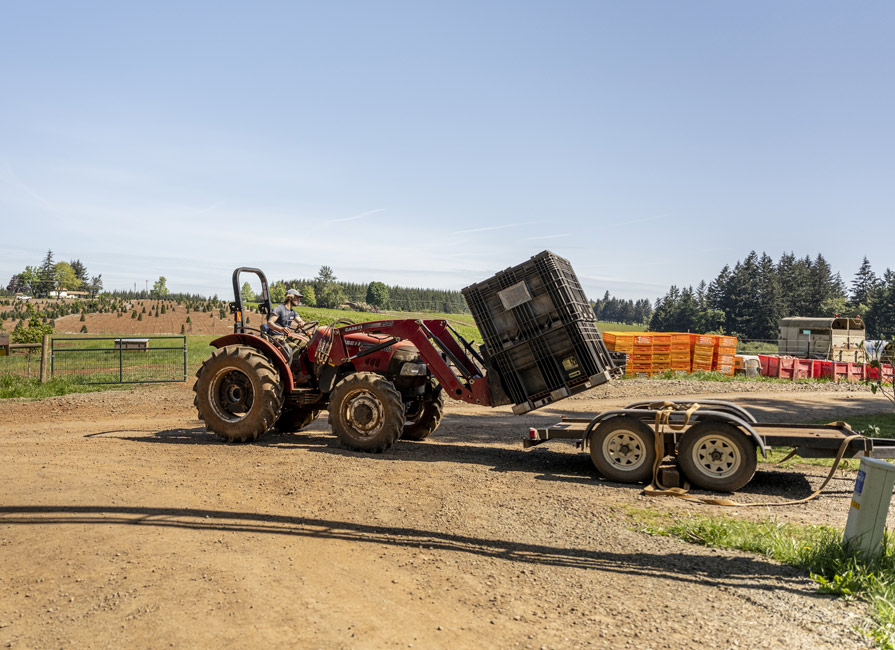One of the key attractions of our Certified Regenerative by AGW program is its practical…
What about eggs from pasture-based farms?
 On November 4, 2008, Californians will vote on the “Prevention of Farm Animal Cruelty Act.” The purpose of this act, as cited by the Attorney General, is to “prohibit the cruel confinement of farm animals in a manner that does not allow them to turn around freely, lie down, stand up, and fully extend their limbs.” An industry-backed coalition, “Californians for SAFE Food” officially launched a campaign against this proposition, calling it “risky” and “dangerous.” A recent article in Marketwatch quotes Julie Buckner, opposition campaign spokeswoman, as saying, “It undermines California’s current high food safety standards, putting us a greater risk with exposure to illness and disease like Salmonella and Bird Flu.” The opposition campaign also claims that the proposition “undermines California’s scientifically-developed, modern egg production systems, which are safe, sound and healthy for hens and humans alike.”
On November 4, 2008, Californians will vote on the “Prevention of Farm Animal Cruelty Act.” The purpose of this act, as cited by the Attorney General, is to “prohibit the cruel confinement of farm animals in a manner that does not allow them to turn around freely, lie down, stand up, and fully extend their limbs.” An industry-backed coalition, “Californians for SAFE Food” officially launched a campaign against this proposition, calling it “risky” and “dangerous.” A recent article in Marketwatch quotes Julie Buckner, opposition campaign spokeswoman, as saying, “It undermines California’s current high food safety standards, putting us a greater risk with exposure to illness and disease like Salmonella and Bird Flu.” The opposition campaign also claims that the proposition “undermines California’s scientifically-developed, modern egg production systems, which are safe, sound and healthy for hens and humans alike.”
The following is a response from Animal Welfare Approved Program Director Andrew Gunther:
I have always smiled as the industry tells us about this scientific approach to farming; I would also like to  take a scientific approach to this response. All science starts with a question. In this case, if we ask, “What is the most welfare-positive way to keep a chicken that lays eggs?” The answer, based on current research, would not be cages.
take a scientific approach to this response. All science starts with a question. In this case, if we ask, “What is the most welfare-positive way to keep a chicken that lays eggs?” The answer, based on current research, would not be cages.
However if we asked, “What is the cheapest, least labor-intensive and most profitable system that ignores the birds’ basic needs?”…battery cages would come out on top.
Sadly, the industry has to use staged arguments for protecting brutal industrial systems. The reality is that the people most affected will be owners of the large egg producing companies who will no longer be able to harvest huge fortunes off the back of cheap labor, and who will not be able to cut costs through the incarceration and mutilation of millions of chickens.
 The opposition campaign cites a fear that Californians, unable to get cheap, factory-produced eggs from their own state, will instead buy eggs from Mexico.
The opposition campaign cites a fear that Californians, unable to get cheap, factory-produced eggs from their own state, will instead buy eggs from Mexico.
Here’s another idea–what about eggs from pasture-based farms in California? This act would not take into effect until 2015–ample time for local California farms to meet demand. The nutritional benefits of eggs from pastured hens is well-documented–higher Omega 3’s, more “good” cholesterol, and they taste better. This opposition campaign is not designed to protect people or hens, but to protect the market share of industrial egg producers.
 There is no evidence to suggest that wild birds present a bigger risk than humans in the spread of Avian Influenza. To the contrary, recent epidemiological studies have shown Avian Influenza is being introduced by workers or visitors, either ignorant or unmotivated to carry out appropriate biosecurity procedures. There are hidden costs to our cheap food. Animal cruelty is one, but disease is another. Salmonella is a disease of industrialization and the poultry industry has managed to invent some new strains for us.
There is no evidence to suggest that wild birds present a bigger risk than humans in the spread of Avian Influenza. To the contrary, recent epidemiological studies have shown Avian Influenza is being introduced by workers or visitors, either ignorant or unmotivated to carry out appropriate biosecurity procedures. There are hidden costs to our cheap food. Animal cruelty is one, but disease is another. Salmonella is a disease of industrialization and the poultry industry has managed to invent some new strains for us.
We have to ask: in a progressive, “modern” society, why do we seem to keep our food animal production in the dark ages? Sadly in the case of laying hens, I mean this quite literally. I encourage consumers in California to read this proposition, and to question whether enough space to “turn around freely” is as radical as the opposition would have them believe. I am inclined to think not.


